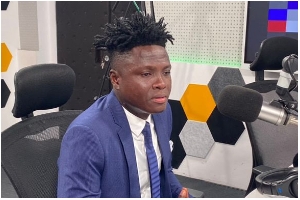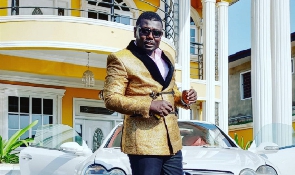- Home - News
- TWI News | TV
- Polls
- Year In Review
- News Archive
- Crime & Punishment
- Politics
- Regional
- Editorial
- Health
- Ghanaians Abroad
- Tabloid
- Africa
- Religion
- Election 2020
- Coronavirus
- News Videos | TV
- Photo Archives
- News Headlines
- Press Release
Opinions of Monday, 22 October 2018
Columnist: Kwaku Badu
Ghana will probably advance meaningfully if NDC stays in opposition for at least 24 years
It is an unobjectionable fact that prudent and pragmatic governments more often than not, manage to improve upon the economic fortunes of their respective countries if they stay a bit longer in power.
Take, for instance, in Rwanda, The officeholder is elected by popular vote every seven years, who, in turn, appoints the Prime Minister and all other members of Cabinet.
Rwandan current president, Paul Kagame, has been in power since 2000. Suffice it to state that Rwanda has undergone rapid industrialisation largely due to the implementation of pragmatic policies and programmes over a sustained period of time.
In Malaysia, Mahathir Mohamad, who returned in 2018 as the head of the opposition coalition, and the oldest Prime Minister At92 years old, previously stabilised the Malaysian economy from 1981 to 2003. Tun M, as Mahathir is called by his supporters, oversaw a period of rapid economic growth and development in Malaysia during his first long stint in office.
In the United Kingdom, the Labour Party assumed power from 1997 to 2010 under two separate Prime Ministers, Tony Blair from 1997 to 2007 and James Gordon Brown from 2007 to 2010.
As a matter of fact, Blair and Brown did their utmost best and managed to stabilise the UK economy until the Labour Party lost power to the Conservative Party in 2010.
In Ghana, since the attainment of independence from the British on 7th March 1957, the NDC tradition (PNDC and NDC) had governed the country more than any other government one can think of. In fact, that tradition had governed Ghana for approximately 27 years out of Ghana’s 61 years.
Thus, we cannot begrudge the thoughtful sceptics for contending persistently that but for NDC tradition’s awful errors in decision-making for well over 27 years, Ghana would have developed meaningfully by now.
Apparently, the critics cannot comprehend how and why some observers would choose to side-line the worst culprit (the NDC) and censure the likes of CPP, PNP, NLC, SMC, and NPP for Ghana’s underdevelopment.
Interestingly, the reflective critics contend that if anything at all, the CPP tradition (CPP and PNP) governed the country for approximately 12 years.
And, the last ‘Nkrumaists’ government, which was formed by the PNP, and led by Dr Hilla Limann, was crudely deposed by the founders of the NDC, spearheaded by Ex-President J. J. Rawlings on 31st December 1981.
The military regimes of the NLC, SMC 1 and 2 ruled Ghana for about 10 years before the founders of the NDC usurping power on 4th June 1979.
The UP tradition (PP and NPP) total share of the day-to-day management of the country is about twelve years to date.
But all said and done, in terms of useful infrastructural projects which put the country at a substantial and propitious position, Dr Nkrumah’s CPP government did exceedingly better than any of the administrations that followed.
It is also worth stating that in spite of the fact that Prime Minister Kofi Abrefa Busia’s government lasted for less than three years, he managed to initiate pragmatic policies and programmes across the length and breadth of the country.
The visible accomplishments of Busia's government included the building of roads, housing, provision of healthcare and water facilities.
The story was however told that Dr Busia was the first Ghanaian leader to establish a ministry responsible for rural development, an initiative which was in consonance with his commitment at raising the living standards of the rural dwellers (Daily Guide, 11/07/2013).”
I must confess that even though I cannot stand coup makers, General I. K. Acheampong (The Head of State from 1972-78) was an exception to my arousing disgust. I had a great deal of respect for the man, primarily due to his great sense of foresightedness.
In my humble opinion, General I. K. Acheampong was a visionary leader who initiated pragmatic policies and programmes such as the operation feed yourself and affordable housing units.
It must also be noted that the Limann government assumed office at a time when the economy was in deep crisis. The credit lines to the country had almost dried up and were blocked due to brutalities and confiscations at the harbours and other points of entry into Ghana by the coup making founders of the NDC.
However, the story was told that through careful negotiations, preparations and the implementation of pragmatic policies and programmes, the Limann government managed to arrest the economic challenges.
More importantly, commendable efforts were made to repay Ghana’s short-term debts, and the Limann government demonstrated the ability to meet Ghana’s debt obligations.
Consequently, Dr Limann’s government managed within 18 months and restored virtually all traditional credit lines (Source: PNC).
But despite all the great efforts, Rawlings and his cohorts did not give Dr Liman and his PNP government the breathing space to govern the country, as they relentlessly breathed down the neck of President Limann.
As a matter of fact, Rawlings and his coup making minions unfairly kept castigating Dr Limann’s administration for what the conspiratorial plotters perceived as economic mismanagement, until Rawlings and his jailbreaking geezers decided to depose Dr Limann.
Subsequently, J. J. Rawlings and the other mutinous jailbreakers took arms and succeeded in usurping the democratically elected government of Dr Hilla Limann on 31st December 1981.
Rawlings and his friends formed a government which they called the Provisional national Defence Council (PNDC) and appointed Rawlings as the chairman.
After imposing himself and despotically ruling the country for over 11 years, J. J. Rawlings retired from the military and bizarrely metamorphosed into civilian president in 1992.
It is, however, worth emphasising that Ex-President Rawlings 96 months democratic rule came to an end in January 2001.
Disappointingly, however, former President Rawlings and his NDC tradition’s memorable achievement was to send us to the membership of the Highly Indebted Poor Countries (HIPC).
It was, indeed, a great relief when President Kufuor took over the presidency in January 2001.
The fact however remains that President Kufuor exerted dint of critical thinking, worked strenuously for eight solid years, laid an auspicious economic foundation by stabilising Ghana’s macroeconomic indicators and retired honourably in January 2009.
Ex-President Kufuor passed on the baton to the late President Mills on 7th January 2009, following his 28th December 2008 election round-off victory.
It is, however, worthy of mention that the late President Mills inherited a total debt of GH9.5 billion and a favourable economic growth of around 8.4 per cent in 2009.
The late President Mills was extremely fortunate to have taken over a very good economic foundation laid by the zestful enthusiast, former President Kufuor and his equally ebullient team.
Take, for instance, three years after former President Kufuor’s NPP government had discovered oil in commercial quantities, the late President Mills turned on the valve at an offshore platform in December 2010 to pump the first commercial oil.
It is worth mentioning that Ghana consequently joined the petroleum exporting countries. And, believe it or not, Ghana started to export crude oil and thus boosted the economic growth.
Gratifyingly, the economy grew from around 8.4 per cent to around 14 per cent by 2011 and Ghana reached the Lower Middle Income status.
Delightfully, Ghana’s GDP grew from $28 billion to a staggering $47 billion by 2011.
Unsurprisingly, therefore, Ghana was earmarked as the world's fastest growing economy in 2010 (Economy Watch, 2010).
“Ghana's economy is growing at a blistering 20.15 per cent” (Economy Watch).
To his credit though, the late President Mills prudently continued to improve upon the excellent economic foundation laid by former President Kufuor and his NPP government.
Unfortunately, President Mills mysteriously departed from life in July 2012. And per Ghana’s 1992 Constitution, Vice President Mahama was the next in line to take over the presidency.
Regrettably, things started to fall apart. It went from bad to worse following President Mills sudden and mysterious death.
Ghana’s total debt rocketed astronomically following the unbridled spending in the 2012 general elections and the numerous corruption scandals involving GYEEDA, SADA, SUBA, Bus Branding, dubious judgement debt payments, amongst others.
In fact, the NDC clamorous communicators could only resort to propaganda when questioned about the GH9.5 billion debt in 2009 which rocketed to GH122 billion in just eight years.
Given the circumstances, how can they convince some of us of their ability to govern the country again when they woefully shrunk Ghana’s GDP from $47 billion to $37 billion in five years?
How can they prove their innocence when they abysmally dragged an economic growth of more than 14 per cent in 2011 to an incredible 3.6 per cent as of December 2016?
Delightfully, under the current NPP administration, Ghana’s economic growth has moved from a nauseating 3.6% in December 2016 to a favourable 8.5%. And the hitherto double digit inflation (15.8 in December 2016) has been reduced drastically to around 9.8% as of October 2018.
Let us be honest, the successive NDC governments have worsened Ghana’s socio-economic development. How pathetic?
In ending, there is no gainsaying the fact that of all their 27 years in governance, the successive NDC governments have not done enough to improve upon the socio-economic standards of living of Ghanaians.
K. Badu, UK.
k.badu2011@gmail.com











